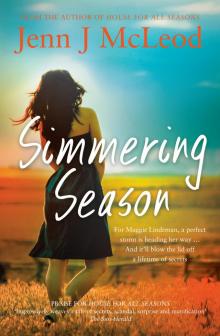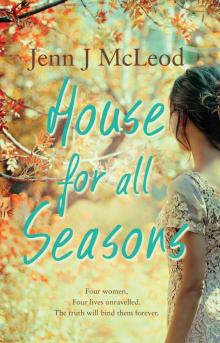- Home
- Jenn J. McLeod
Simmering Season Page 28
Simmering Season Read online
Page 28
‘No, no. Good today, actually. What about you, Maggie?’
‘What about me?’ Those three words, said with a nurse’s compassion, threatened Maggie’s undoing.
She was about to lose it, that’s what. Wasn’t the reason she’d been moving so fast to avoid asking herself that very question? Had she stopped now to answer Roslyn truthfully, she would more than likely fall in a heap where she stood.
At least you’d be collapsing in front of a nurse’s station, she told herself, pressing a hand to one cheek, surprised at the radiating heat.
She had to slow herself down, but she couldn’t stop. Keeping busy, occupying her mind any way possible, was how she would get herself to the next stage. Maggie dreaded to think about what that stage might throw at her. Surely, things couldn’t get any worse.
‘I’m fine, Roslyn,’ Maggie said with forced bravado. ‘Just looking forward to seeing my favourite guy.’
Her father’s door was open.
‘Hi, Dad.’
‘Magpie?’
Maggie smothered her gasp behind her hand. Did he call her Magpie? It took every scrap of courage not to burst into tears, but she wouldn’t waste time crying, not on a good day. She bent over and kissed his head the way she always did, the way her mother always did, and the way she kissed Noah until her son had started shying away from such affection.
She’d hoped—make that desperately needed—that this was a good day for her father and so far, so good. Rather than slouched over and drooling in his sleep, the Rev sat propped up in a chair, the rosy tinge staining both cheeks reminding Maggie of old-fashioned baby portraits.
‘Look what I brought with me today.’ Maggie fished the camera from its protective carry bag, removed the lens cap and adjusted the aperture to suit the fluorescent brightness of the room. The camera bag had been sitting in her room waiting for the right moment to get a good dusting off ever since the night Fiona had gushed over Maggie’s portfolio. Today was that moment. ‘I thought I’d start taking pictures again.’
‘Why?’
‘Why not?’ she said, snapping her father’s portrait in close up, making a composition of the creases and crêpy skin. ‘I need a hobby.’ Because I don’t have enough to do already and I need a distraction to stop me going mad. ‘The reunion inspired me to get my old photos out, which inspired me to get my old camera out, which—’
‘Reunion?’
‘You remember, Dad. I told you about the school’s centenary celebrations. About 200 people turned up in the end. Only a few out-of-towners who’d bought tickets reneged last minute for some reason. The long distance no doubt, maybe the weather up north. There are a few flooded roads, I hear.’
Maggie stopped herself. She was talking weather—the topic of last resort—when she should consider raising a certain matter with her father. Was now a good time? He was looking so alert and was communicating. Single words so far, but better than a vacant stare.
‘He came,’ her father said.
Maggie knew who ‘he’ was by the condemnation in his tone. She’d heard it before, any time the Rev said, ‘the boy who took “our Michael” away that summer’.
She took a breath, pretending to focus her camera on the vista outside the window, then with forced cheer said, ‘Yes, Dan Ireland came up from Sydney. He’s gone now.’ When she turned around Maggie saw the shimmer of tears in her father’s eyes.
‘Oh, Dad, I didn’t mean to upset you.’
‘There,’ he said, one long, gnarled finger outstretched, pointing to the only cupboard in the room.
Maggie slid the door of the small wardrobe open. ‘What is it, Dad?’ she asked. ‘What do you want?’
‘Box. Box.’
‘What sort of box? Big box? Little box?’ Maggie checked the cupboard floor then ran her hand along the top shelf, hitting something hard. With the tips of her fingers she managed to work the object closer until she could see the small wooden box, the one Michael had made in woodwork class. He’d made two: one for himself and one for his father, each with their name etched onto the lid. He’d been so much more artistic than Maggie, inspiring one art teacher to visit the Manse. A parent–teacher–student discussion encouraging Michael to ignore the ribbing he got from other students over his inspired pieces and make his own choices about what he wanted. Soon after though he stopped his pen and paper doodles altogether, choosing spray cans and street signs instead.
Maggie fought back the surge of emotion as her finger traced the letters of Michael’s name. The second box with her father’s name on it was possibly still at the pub, stored in an old tea chest somewhere along with her mother’s mementos. Maggie would make a point of finding the box for Noah. It was time. At his age he’d appreciate the sentimentality of such a treasure. Maybe she could present it to him tonight, maybe initiate a conversation about …
‘Inside. Inside.’ Joe waved a thin, crooked finger impatiently.
‘This is Michael’s,’ she said, the tip of her finger gliding over the etched lettering before she turned the tiny brass key, flipped the lid open and took inventory of the contents: the order-of-service card from Michael’s funeral, a wad of sympathy cards, a small collection of photos tied with a white, but yellowing, ribbon.
‘Bible. Bible.’
‘Okay, Dad, okay.’ Maggie passed the leather-bound edition to him. ‘What do you want with that?’
His shaking hands thumbed the pages and a slip of folded paper and an envelope fell out. She went to pick up the envelope, but Joe smacked her like a naughty child, startling her.
‘Ouch!’ She clutched the back of her hand to stop the sting, then took the note he handed her.
She scanned the entire contents first. The writing was messy, frayed fold-lines obliterating some words altogether, but the name and signature on the bottom was clear.
Dan Ireland.
What was it about this man? For twenty-odd years nothing, then—BAM! He was everywhere. In her email inbox, in her overloaded mind, and now in her trembling hands. Without taking her eyes off the scrawled lettering, she reached out, dragged the small chair beneath her, and eased her body down.
The note read:
Dear Sir,
I am not sure you will even want to read this letter, but I am sending it in the hope that if you can’t do it now you may be able to read it one day and know how sorry I am for the grief you have suffered.
I know you blamed me for Michael’s death and I accept that I should have known better. I want you to know that while I can’t bring your son back, I can and will never forget him.
I am not seeking forgiveness. I am yet to forgive myself. I do, however, need you to know the truth. I am now free to give you that.
It was my idea. It was my car. It was also my choice to drink so much that I handed my keys to Nate Parker. You’ll remember Nate. He wasn’t supposed to associate with us at all, let alone be with us that night. So when Mike fell, I agreed to say I was driving. I was a juvenile—not quite eighteen. Nate was older and the grandson of a highly respected police officer. You have to understand, at that time we thought Mike was just hurt and that he’d pull through. Once we’d provided our statements to police our lie was set in stone. Changing our story wouldn’t bring Michael back.
You might think I escaped conviction because I was young, but I’ve been punished every day of my adult life. I see the devastating impact on families and understand there are no accidents, only a series of events that individually are not dangerous, but combined—alcohol, young drivers, stupid dares, muddy paddocks—allow the unthinkable to happen.
In the end it doesn’t matter who did what that night. There was no taking the night back. You lost your son and Maggie lost her brother. Now, with Nate Parker gone, killed in a single-vehicle drink-driving crash not long after I joined the Police Force, I no longer have to keep the truth from you. I so desperately want Maggie to know the truth, too.
Everyone’s life changed the night Michael died. Mine included. I
’m a father now with twins—a boy and a girl. I named the girl Emily. My boy I named Michael. We go to church as a family every Sunday. (Please tell Maggie I actually go inside these days!)
Sir, believe me when I tell you that the grief I brought upon you and your family is never far from my thoughts. I’m sorry I never knew what church was when I was young, but you know what my father was like.
I often wonder, as I’m sure you do, what might have been had that night played out differently, and while I wish I could turn back time, I also know that we are dealt these challenges for a reason. I know one day that reason will become clear. God willing I will be wise enough and open enough to see it when it does.
Yours sincerely,
Dan Ireland
Maggie reread the last paragraph through a blur of tears, the flimsy notepaper trembling despite her firm grip. She turned away to reach for a tissue, not wanting her father to see her crying. She need not have worried about that. When Maggie looked at the Rev, her head full of questions, he had resumed the all too familiar slouch and drool position of semi-slumber. His hands lay open in his lap, the other small envelope taunting Maggie. The writing she knew. It was her father’s, although not the stilted, jerky script of an old man. This penmanship was of a much younger scribe, of a minister who once took pride in writing, by hand, children’s names on communion cards and hymn numbers on chalkboards.
The addressee she also knew: Daniel Ireland.
‘How is he?’ the nurse said, poking her nose around the corner of the door.
Startled from her seated position, Maggie jolted up from the chair. She tucked both letters into the pocket of her shorts as if they were five-dollar notes she’d pinched from her father’s wallet.
‘He was here for a bit, Roslyn. Sleeping now.’
She asked the nurse to help her get her father back into the bed where he’d be more comfortable. Then she kissed him on the cheek, returned the box to the wardrobe, and took the Bible and the notes back home.
34
‘Hey, love.’ Concern etched two deep furrows in Ethne’s large forehead, her pencilled eyebrows all but buried between them. ‘What are you doing hiding out here?’
‘Hiding.’ Maggie had poured a beer and tucked herself away in a corner of the beer garden to make the most of the unexpected drop in temperature. After a sunny start, the day was starting to cloud over—again.
Was nothing predictable? Not even the weather followed its usual pattern any more. After decades of drought, too much rain in the north was starting to inundate inland New South Wales. A devastating blow for some farmers and a blessing for others. According to locals, Calingarry Creek hadn’t flowed so fast in years. Property owners with river access were even preparing to raise the pumps and machinery that had dotted the banks for decades.
‘Noah rang,’ Maggie told Ethne. ‘He said he’d be home late. Something about Cory and band practice. I get the feeling I’m not the only one hiding. I worry about him.’
‘You’re doing the right thing giving him space, though.’
‘Not sure what’s going to drive me crazy first. The walking on eggshells or that damn storm bird and its incessant chanting all night—as if we don’t know there’s a bloody storm coming, for goodness sake. I just wish it would hurry and get here. I’m trying to remember … Is it La Niña that brings hot, stormy fronts and El Niño is drought, or is it the other way around? Whichever way it is, it’s cruel. The locals have finally adjusted to life being hard and dry, then down comes the rain and—’
‘Washes soggy old Incy Wincey out?’
‘What?’
‘You’re rambling, and about the weather. Anytime you ramble I know it’s really bad. When you ramble about the weather, I know it’s worse. You feeling that urge to stick your head in the sand again?’
The page slid across the table under Maggie’s index finger, like it was a planchette on a Ouija board. She’d played the Ouija board game as a child, just after Mary Lindeman died. Tracy had sworn the spirit board talked, translating messages from heaven. If only that were true, Maggie would find one right now and have a chat with poor Nate Parker.
After a quick scan of the note, Ethne looked up questioningly. ‘This has been around a while.’
‘Yep.’ Maggie shrugged and slipped the other note out from in between the old Bible pages. ‘Here’s Dad’s reply,’ she said, watching the frown on Ethne’s face grow with each line until her hands dropped hard into her lap, as if the note was suddenly a heavy weight.
‘I’m guessing he never posted this, then?’
In response, Maggie held up the addressed envelope with the pristine stamp.
‘What are you going to do with it now?’
‘I’ve been sitting here for the last ten minutes trying to figure that out. Is it my place to send a letter like this after so long? And after what you said this morning, about Noah wanting someone else to do the telling, I had to wonder. Did Dad give this letter to me for that purpose?’
‘Maybe. We all want to right the wrongs before we meet our maker. You’re worried about dredging up bad memories for Dan though, huh? You think he’s moved on?’
‘No. I know he hasn’t moved on—not entirely—even though we’re talking about something that happened over twenty years ago.’ Maggie had already noticed the significance of the letter’s date. Dan had written it on an anniversary of Michael’s death. ‘Now Dan works in crash investigation. Who’d have guessed? A law-abiding family man. If only old Mr Ireland knew that every time Dan attends a crash and confronts a family with that awful news, he’s punishing himself for his own misspent youth.’
‘I guess he sees himself helping to bring closure to families, helping them understand how and why they’d lost their loved one. Such a job would be hard on anybody.’
‘Yes, and for Dan, having carried the guilt of Michael’s accident for such a long time, it would be a constant reminder. But what Dad wrote … his words … Dan should know he’s been forgiven, shouldn’t he?’
‘How do you feel about letting him know? Do you need to forgive?’
Maggie shook her head in her hands. ‘I never had a problem forgiving Dan. I never got mad, only sad for a while. But I can’t believe Dad’s known all this time that Dan wasn’t driving the car when Michael fell. He never told me.’
‘So, Joe gave the letters to you today with no explanation.’
‘Dad was having a good day. I happened to mention the reunion. Then he asked about Dan. I don’t know why he thought about the letters today of all days.’
‘And did your face light up when you mentioned Dan Ireland’s name?’
‘I beg your pardon?’
‘I’m talking about the little pink blush that develops on your neck and face every time his name comes up.’ Ethne slapped her hand with its chubby fingers and fat knuckles over Maggie’s on the table and patted it twice. ‘Come on, where’s that tough cookie I know and love?’
‘Not feeling so tough. What’s that saying? It never rains, but it pours?’
‘Ah, yes. When troubles come, they come together.’
‘I’ve hardly thought about Dan Ireland all these years. Not until this damn reunion.’
That wasn’t entirely true. For the last two years she’d thought about him every time his father passed by the pub. Charlie Ireland made a habit of checking in whenever heading off to throw a line in the river. The precautionary ritual Maggie had been happy to maintain had been a Joe Lindeman thing, established in the early days when there were no such things as mobile phones.
‘What do I do?’
‘Love, don’t you think you’ve got enough going on right now? That letter has been sitting there undelivered for years. A little more thinking time won’t hurt. Put it aside. You’ll know what to do.’
‘You are a wise old bird, aren’t you?’
‘Awright you, enough of the old.’
Later that night in her room, after tucking the Bible and its two notes safely in he
r underwear drawer, Maggie fired up the old laptop to check emails. There was one from Brian and another one from Dan.
After a double click, Maggie scanned her husband’s latest scant and scatty communication. Today’s message had all the markings of a down day, more down than usual from the lack of exclamation marks. Only a week ago he’d raved in an email about the i-ICON producers looking to bring eliminated Season One acts back as a surprise in Season Three next year. They couldn’t say any more except the concept was under consideration, reminding all contestants that the same contract conditions applied and any breach of their confidentiality agreement could be a costly one.
Today Brian’s email had few words: They don’t want me, Maggs.
Maggie clicked the delete option, wishing certain parts of real life could be erased so easily. Then she deleted some junk mail before letting the cursor hover over an email from Dan that she told herself was best left unopened. After Brian’s not too cheery message she was definitely in a deleting mood. However, she was also in the mood for something to lift her spirits and Dan Ireland might just do that, as long as he wasn’t apologising—again—or justifying his infidelity, both of which Maggie could do without. For a while she toyed with the mouse, practising her delete key skills on another half-dozen junk emails. She read the specials bulletins from various food and beverage suppliers, and when she’d finished she manoeuvred the mouse back to Dan’s message.
Delete unread or double-click?
She double-clicked and smiled at the message speckled with yellow emoticons of every type.
Hi Maggie,
I’d prefer to talk than email. I did try to call a couple of times. Seemed to be a bit of static on the line by the name of Ethne! Since when do country pubs employ barmaids that double as bodyguards? I was deaf in one ear for a week after she hung up on me.
Anyway, if you would consider calling me, maybe we can talk. (Well, obviously not ‘maybe we can talk’. If you called we’d actually be talking, wouldn’t we? I mean … that’s what people do when they call. They talk—right?)

 A Place to Remember
A Place to Remember Simmering Season
Simmering Season Season of Shadow and Light
Season of Shadow and Light House for All Seasons
House for All Seasons Other Side of the Season
Other Side of the Season